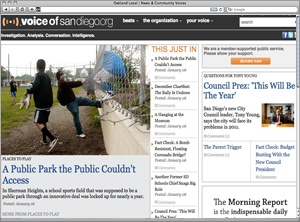Highlighting the impact of reduced social services during the recession has been a priority for the Voice. “What we can show is the real impact on people and really prove this isn’t just some Republican, conservative idea, this is really what’s happening here,” says thirty-year-old editor Andrew Donohue.
Published from an office in San Diego’s airport district, across the water from the city’s glittering downtown, Donohue leads a team of nine full-time writers and photographers, and six support staffers, including a Web editor and director of development. In many ways they function like the staff of a traditional newspaper–Voice was founded in 2005 by philanthropist Buzz Woolley and journalist Neil Morgan to act as a more robust alternative to the ailing San Diego Tribune, for which Morgan was a longtime columnist. A Monday news meeting determines weekly priorities; reporters file short posts daily on politics, public safety, arts, and education, and work on longer features throughout the week.
The digital-only outlet has only this year fully embraced its “online format,” says Donohue, a former print reporter and current board member of the nonprofit Investigative Reporters and Editors (IRE). Originally, Donohue ran the Voice like a newspaper, producing and assigning content on a nightly deadline to be published the next morning. It took the Voice five years, up to June 2010, to abandon that “cycle model” for a “news flow” one.
“It surprisingly stuck with us a lot longer than you would’ve imagined,” he yes. “I used to have to plan tight to make sure we have something new. Now our staff has grown and I can assume a steady stream of really good posts.” You can find them on a crowded but clean homepage, organized mostly by “beats,” and designed using the Blox content management system produced by TownNews.com.
Voiceofsandiego.org’s budget is comprised of foundation grants, major and member donors, content syndication revenue, and ad dollars–and it’s up 20 percent for 2011. But the outlet is not getting comfortable. “We’re very fortunate to be sort of the darling of national foundations, but they have made it clear they are not here for the long haul,” Donohue says. “They are here to fund us to see what we can do and to see if what we are doing can be replicated in other places.”
Voice’s mission mandates that it “increase civic participation by giving residents the knowledge and in-depth analysis necessary to become advocates for good government and social progress.” That’s hard work. It took Voice reporters two years–plus the summers of six interns from the Rose Institute at Claremont McKenna College–to create the comparative analysis at the core of the “Out of Reach” social services investigation. County officials have since sped up their food stamp program, and the Board of Supervisors is considering significant reforms to many more of San Diego’s social services in 2011.
A big goal of 2011: getting more local donors, in an effort to move closer to a NPR-style funding structure. Donohue and his staff believe there are perhaps 200,000 potential new readers out there, judging from the turnout of hard-core, concerned citizens voting in San Diego’s most obscure local contests each year. Attracting their attention means making the outlet an indelible part of San Diego life.
To that end, the Voice is adding staff to match the surprise popularity of its fact-checking blog, San Diego Fact Check. The blog, which catches public figures lying, and sometimes even telling the truth, also airs as a TV segment on NBC San Diego. “It turned out to be a real success,” says Donohue. Fact Check has begun busting more colorful local myths as well, like the legend of a mysterious “blob” living underneath downtown (it was actually an underground plume of gasoline and diesel).
With several towns replicating voiceofsandiego.org’s model, and the industry watching to see if Donohue and his team have struck local startup gold, the editor is feeling the pressure.
“We have a long way to go,” Donohue says.
 SAN DIEGO, CALIFORNIA — Exposing the darker side of a sunny beach city, the six-year-old news site Voice of San Diego is having a larger influence than its small size might suggest.
SAN DIEGO, CALIFORNIA — Exposing the darker side of a sunny beach city, the six-year-old news site Voice of San Diego is having a larger influence than its small size might suggest. 
